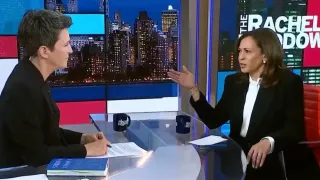
4 hours ago
Karoline Leavitt Believes Trans People Are Being 'Driven to Such Evil and Such Hatred'
READ TIME: 3 MIN.
White House Press Secretary Karoline Leavitt faced intense scrutiny following statements made at a September 22, 2025, press briefing. During the session, responding to questions about a recent series of violent incidents, Leavitt referenced “a pattern of transgender violence” and suggested that people are being “driven to such evil and such hatred” . The remarks, delivered as part of a broader response on national violence, have been widely interpreted as linking transgender identity to acts of violence, a connection that LGBTQ+ organizations and experts strongly dispute.
During the briefing, Leavitt was asked by a reporter about recent violent incidents involving individuals identified as transgender. She replied that the administration was “looking into transgender violence,” adding, “It’s definitely something worth looking into and I think anyone who denies that at this point is being willfully ignorant and the administration is taking it seriously. All causes of violence and why these people would be driven to such evil and such hatred. Uh and there’s probably many answers to that question, but the administration is really focused on all of them” .
These comments were quickly circulated on social media and news platforms, with many LGBTQ+ advocates expressing alarm at the language used. Critics argue that Leavitt’s phrasing risks painting transgender individuals as inherently linked to violence, a narrative that is unsupported by available data and research .
Leading LGBTQ+ advocacy groups, including the Human Rights Campaign and GLAAD, condemned the remarks, stating that such rhetoric perpetuates harmful myths and contributes to the marginalization of transgender people. In a statement provided to LGBTQ Nation, a spokesperson for the Human Rights Campaign said, “There is no credible evidence that transgender people are more likely to commit acts of violence. In fact, transgender people, particularly transgender women of color, are disproportionately the victims, not the perpetrators, of violence in the United States” .
The American Psychological Association has also noted that misrepresenting transgender people as dangerous or violent can exacerbate stigma, discrimination, and mental health challenges within the community .
Advocates point out that anti-transgender rhetoric has increased in recent years, with legislative efforts and public statements often framing transgender people in a negative light. According to the Human Rights Campaign, 2024 saw record numbers of anti-transgender bills introduced at the state level, many of which relied on misleading characterizations of transgender individuals .
Research consistently demonstrates that transgender people are significantly more likely to experience violence and discrimination than to perpetrate it. The U.S. Transgender Survey found that in 2022, nearly half of all transgender respondents reported being verbally harassed, and one in ten reported being physically attacked because of their gender identity .
The response to Leavitt’s remarks has not been limited to advocacy groups. Several members of Congress have called on the White House to clarify its position and to reaffirm its commitment to protecting transgender Americans from violence and discrimination. Representative Alexandria Ocasio-Cortez released a statement urging the administration to “reject all attempts to scapegoat and endanger transgender Americans,” noting that “public officials have a responsibility to lead with facts and empathy, not fear and division” .
Meanwhile, conservative commentators and some lawmakers have defended Leavitt, arguing that her remarks were taken out of context and that the administration is right to investigate all forms of violence. Still, advocates stress that singling out transgender identity in this way, particularly without clear evidence or context, poses real risks to an already vulnerable population .
Media watchdogs and LGBTQ+ journalists have underscored the importance of responsible reporting when discussing violence and marginalized communities. GLAAD’s Media Reference Guide urges journalists to avoid conflating individual criminal acts with any demographic group and to contextualize data accurately .
Dr. Harper Jean Tobin, a policy expert on transgender rights, commented, “When high-ranking officials suggest a link between transgender identity and violence, it exacerbates misinformation and can embolden those who wish to harm the community. That’s why accuracy and nuance are essential in public discourse” .
In the wake of Leavitt’s comments, LGBTQ+ organizations are renewing calls for the administration to meet with transgender advocates, review its communications protocols, and invest in programs that address the root causes of violence — including discrimination, poverty, and lack of access to healthcare and housing for transgender people .
As the debate continues, many in the LGBTQ+ community emphasize the importance of amplifying transgender voices and centering the lived experiences of those most affected by both violence and stigmatizing rhetoric. Advocates urge the public and policymakers alike to base their responses on facts, not fear, and to support initiatives that foster safety, dignity, and equality for all.






